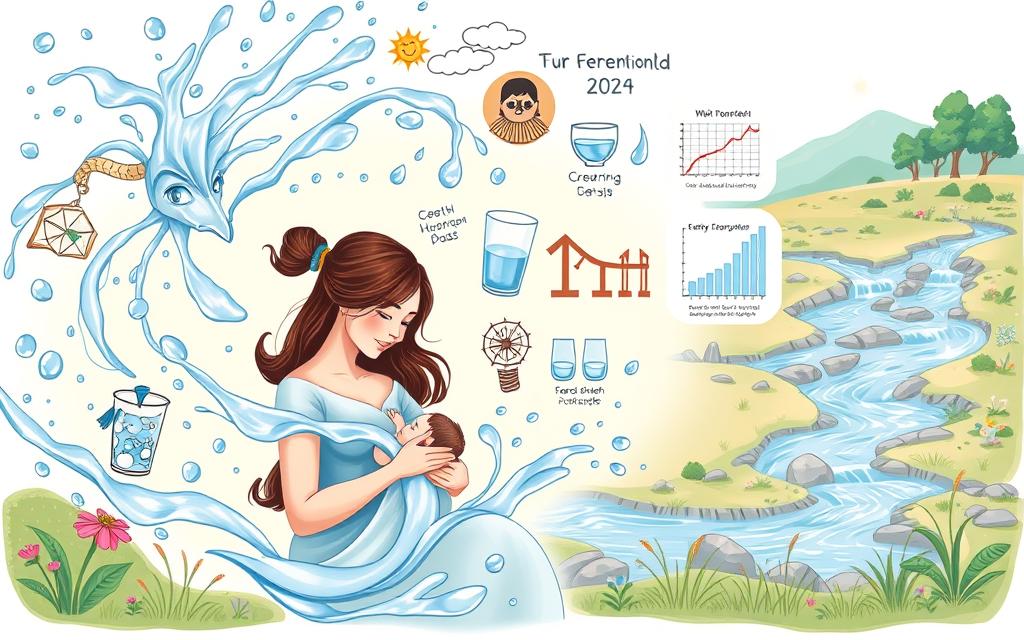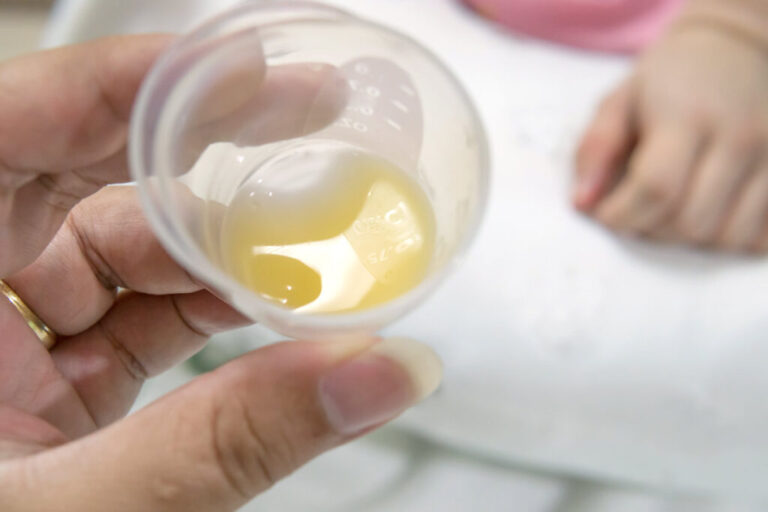Breastfeeding Hydration: The Right Amount of Water to Drink

As a breastfeeding mom, drinking enough water is key. It helps keep milk production up and supports your health. You lose about 25 ounces of water a day through milk, so drinking water is important.
Drinking water helps your milk supply. It’s good for both you and your baby. It keeps you healthy and your baby growing well.
Studies say breastfeeding moms need 128 ounces of water a day. Drinking water helps prevent dehydration. Dehydration can slow down your baby’s growth.
It can also make you feel tired and cause dark yellow urine. Staying hydrated helps avoid these problems.
Knowing how much water you need is important. It’s not just about drinking water. Eating well and exercising also help.
By focusing on water, you support your milk and your baby’s health. It’s a big part of being a breastfeeding mom.
Key Takeaways
- Breastfeeding women should drink at least 128 ounces (3.8 liters or 16 cups) of water daily
- Proper hydration is essential for milk supply and overall health
- Dehydration can lead to reduced growth metrics in babies
- Water intake can help alleviate symptoms of dehydration
- Breastfeeding mothers can meet about 20% of their water requirements through solid food
- Nursing mothers should prioritize water intake to support their milk supply and overall health
Understanding the Importance of Hydration While Breastfeeding
Hydration is key for lactation, helping to make high-quality breast milk. The Academy of Nutrition and Dietetics says breast milk is the best food for babies. It’s full of hydration benefits for both the milk and the mom’s health.
Drinking enough water is vital for milk production. Breast milk is mostly water, at about 87%. Experts say breastfeeding parents should drink 16 cups (128 ounces) of water daily. If your urine is pale yellow, you’re hydrated. Darker urine means you need more water.
To stay hydrated, nursing moms can try these tips:
* Drink an 8-ounce glass of water, juice, or milk at each meal and every time you feed your baby
* Limit caffeine to no more than two 8-ounce glasses or cups a day
* Drink about 500 more calories a day to keep a good milk supply and health while breastfeeding
How Much Water Should You Drink While Breastfeeding?
Staying hydrated is key for breastfeeding moms. It affects milk production and health. Experts say to drink 1.5 to 2 liters of water daily, plus an extra liter for nursing. This helps replace lost fluids and supports milk production, which is mostly water.
It’s important to drink when you’re thirsty, not just because you have to. Drinking a glass of water each time you nurse helps keep you hydrated. By following these tips, you can have a healthy breastfeeding journey.
Here are some key points to consider when it comes to water intake and breastfeeding:
- Drink at least 1.5 to 2 liters of water per day
- Add an additional 1 liter of water for nursing
- Listen to your body and drink when you feel thirsty
- Drink a glass of water every time you breastfeed
By focusing on your water intake, you support your health and your baby’s. Stay hydrated and drink plenty of water all day. This will help you have a successful and healthy breastfeeding experience.
Signs Your Body Needs More Water During Breastfeeding
As a breastfeeding mom, knowing when you’re dehydrated is key. Dehydration can affect your milk supply and health. The American College of Obstetrics and Gynecology says signs include dark yellow urine, dry mouth, and feeling tired.
Watch out for these hydration warning signs:
- Dry mouth and throat
- Dark yellow or brown urine
- Fatigue and dizziness
- Headaches and muscle cramps
Dehydration needs quick attention to avoid harming your milk supply and baby’s health. Drinking enough water is essential. Try to drink at least 16 cups of fluid each day. This includes water, drinks, and moist foods.
Being well-hydrated helps you make better milk for your baby. This is important for their growth. By staying hydrated and knowing when you’re dehydrated, you can have a healthy breastfeeding journey.
Best Times to Drink Water Throughout Your Nursing Day
Staying hydrated is key for breastfeeding moms. A well-planned hydration schedule can really help. MyHealth.Alberta.ca says drinking water when you feel thirsty keeps your body working right. Try to have a glass of water each time you nurse to keep your water intake up throughout your nursing day.
Creating a hydration schedule is easy. Just keep a filled water bottle in your nursing spots. This makes it simple to drink when you need to. Drinking water before and after nursing also helps keep you hydrated. By focusing on your water intake, you support your health and your baby’s too.
- Keep a water bottle with you at all times
- Drink water before and after nursing sessions
- Avoid caffeinated beverages, which can act as diuretics
Follow these tips and keep up a healthyhydration schedule. This way, you’ll make sure you’re getting enoughwater intake to support your breastfeeding journey.
Creative Ways to Increase Your Daily Water Intake
Staying hydrated is key, even more so for nursing moms. Boosting your water intake can be tough, but there are fun ways to do it. Try drinking water after brushing your teeth or on your commute.
Watery fruits like watermelon and oranges can also up your water intake. The Academy of Nutrition and Dietetics says they’re great for staying hydrated. Plus, you can swap plain water for herbal teas or low-sugar sports drinks.
- Drinking a glass of water before each meal
- Consuming foods high in water content, such as lettuce, celery, and zucchini
- Limiting caffeine and added sugar intake
By adding these hydration tips to your day, you can drink more water. Don’t forget to try beverage alternatives to keep things interesting and fun.
Common Myths About Water Intake and Milk Supply
Many mothers wonder if drinking water affects their milk supply while breastfeeding. A common myth is that more water means more milk. But, MyHealth.Alberta.ca says drinking too much water doesn’t boost milk supply. Instead, how often you nurse or pump is key.
Another myth is that breastfeeding moms must drink a certain amount of water daily. Staying hydrated is important, but the Academy of Nutrition and Dietetics recommends 16 cups (128 ounces) of water a day. Yet, this can change based on each person’s needs. It’s better to drink when you’re thirsty, not by a set rule.
It’s important to know the truth about hydration myths and breastfeeding. Understanding how water and milk supply relate helps mothers make better choices. They can focus on nursing or pumping often to keep their milk supply healthy.

- Breast milk is about 87% water
- Frequent nursing or pumping is key for milk supply
- Good hydration helps avoid tiredness, brain fog, and feeling slow
The Connection Between Hydration and Breast Milk Quality
Hydration is key to making high-quality breast milk. The American College of Obstetrics and Gynecology says breast milk is the best food for babies. It’s mostly water, so staying hydrated is vital.
A hydrated mom makes better breast milk. This milk has the right nutritional content. Drinking enough water helps keep milk production up. Experts suggest breastfeeding moms drink at least 128 ounces a day.
- Drink plenty of water all day
- Eat hydrating foods like fruits and veggies
- Stay away from caffeinated and sugary drinks
By focusing on hydration and eating well, moms can make the best breast milk for their babies.
Seasonal Considerations for Nursing Mothers’ Hydration
As the seasons change, nursing mothers’ hydration needs may vary. In hot weather, it’s key to drink more water. This helps keep you hydrated and supports milk production. The American College of Obstetrics and Gynecology says nursing mothers need more water in hot weather.
Staying hydrated is vital for seasonal hydration. It helps control body temperature and aids in making breast milk, which is mostly water. Nursing mothers should drink lots of water all day, more so in hot weather. This ensures they meet their water intake needs.
Here are some tips for staying hydrated during hot weather:
- Drink water regularly throughout the day
- Avoid caffeinated and sugary drinks that can exacerbate dehydration
- Include hydrating foods, such as fruits and vegetables, in your diet
By following these tips and staying mindful of their water intake, nursing mothers can meet their hydration needs. This is important for their health and well-being, even in hot weather.
Health Complications from Inadequate Water Intake
Drinking enough water is key for nursing mothers to avoid dehydration problems. MyHealth.Alberta.ca says dehydration can cause constipation, urinary tract infections, and kidney stones. It’s vital for breastfeeding moms to drink water to stay healthy.
Short-term Effects
Dehydration’s short-term effects might seem minor but can affect breastfeeding. Symptoms include fatigue, headaches, and dry mouth. Ignoring these signs can lead to bigger health problems, making it important for moms to drink water.
Long-term Consequences
Dehydration’s long-term effects can be serious, like kidney damage and urinary tract issues. Nursing mothers need to drink water often and watch their urine to avoid these risks.
When to Seek Medical Help
If a nursing mom feels very thirsty, has dark urine, or feels dizzy, she should get medical help fast. A doctor can help manage dehydration and prevent it from happening again. Drinking water and getting medical help when needed helps breastfeeding moms stay healthy.
Remember, staying hydrated is key for nursing mothers to avoid dehydration problems. Drinking plenty of water and getting medical help when needed helps ensure a healthy breastfeeding experience.
Building Healthy Hydration Habits
It’s key for nursing moms to stay hydrated to make good milk for their babies. The Academy of Nutrition and Dietetics says a daily routine helps. Setting reminders to drink water at certain times is a good start.
Drinking water at each breastfeeding session is a good idea. This can be 8-10 times a day. Eating hydrating foods like cantaloupe, watermelon, and strawberries also helps. These habits keep nursing moms hydrated and healthy.
Here are some tips for staying hydrated:
- Set reminders to drink water all day.
- Make a daily routine with hydrating foods and drinks.
- Check your urine to make sure it’s pale yellow or clear.
Following these tips makes hydration a priority. This benefits both nursing moms and their babies.
Special Circumstances Affecting Water Needs
Nursing mothers have unique water needs that can be influenced by various factors. This includes certain medical conditions or medications. The American College of Obstetrics and Gynecology says nursing mothers with specific medical conditions may need to drink more water to stay hydrated.
Some special circumstances that can affect water needs for nursing mothers include:
- Certain medical conditions, such as diabetes or thyroid disorders
- Medications that increase urine production or affect hydration levels
- Environmental factors, such as high temperatures or humidity
It is essential for nursing mothers to be aware of these special circumstances. They should adjust their water intake to ensure they stay hydrated. This supports their baby’s health.
Conclusion: Maintaining Optimal Hydration for Successful Breastfeeding
Keeping well-hydrated is key for successful breastfeeding. By following the tips in this article, nursing moms can drink enough water. This supports milk production and their health. Experts say breastfeeding moms should drink about 128 ounces (16 cups) daily to avoid dehydration and keep their milk supply up.
Staying hydrated is important for both mom and baby. With a bit of effort, healthy hydration habits can become part of your nursing routine. Drinking enough water helps you feel more energetic, less stressed, and ensures your baby gets the best breast milk for their growth.






